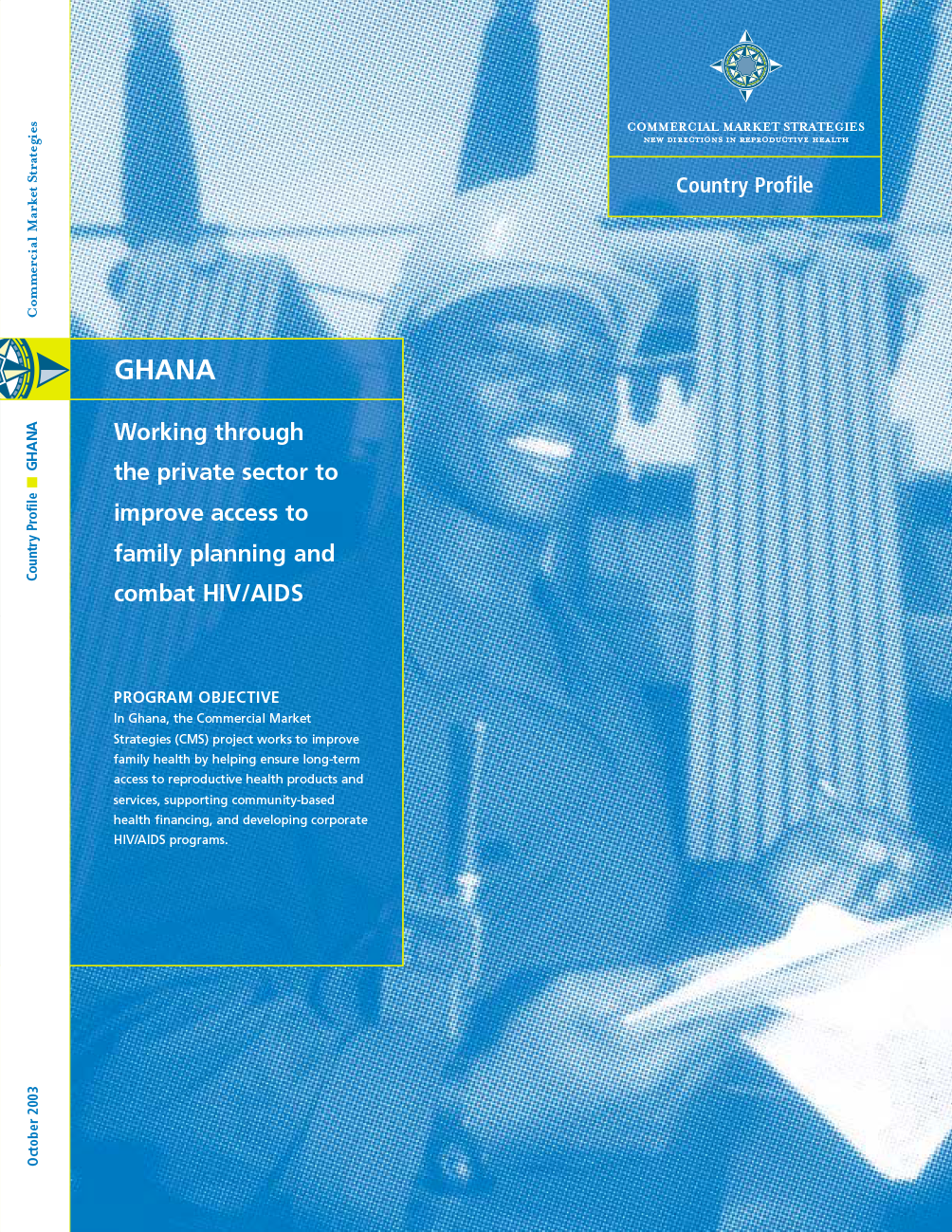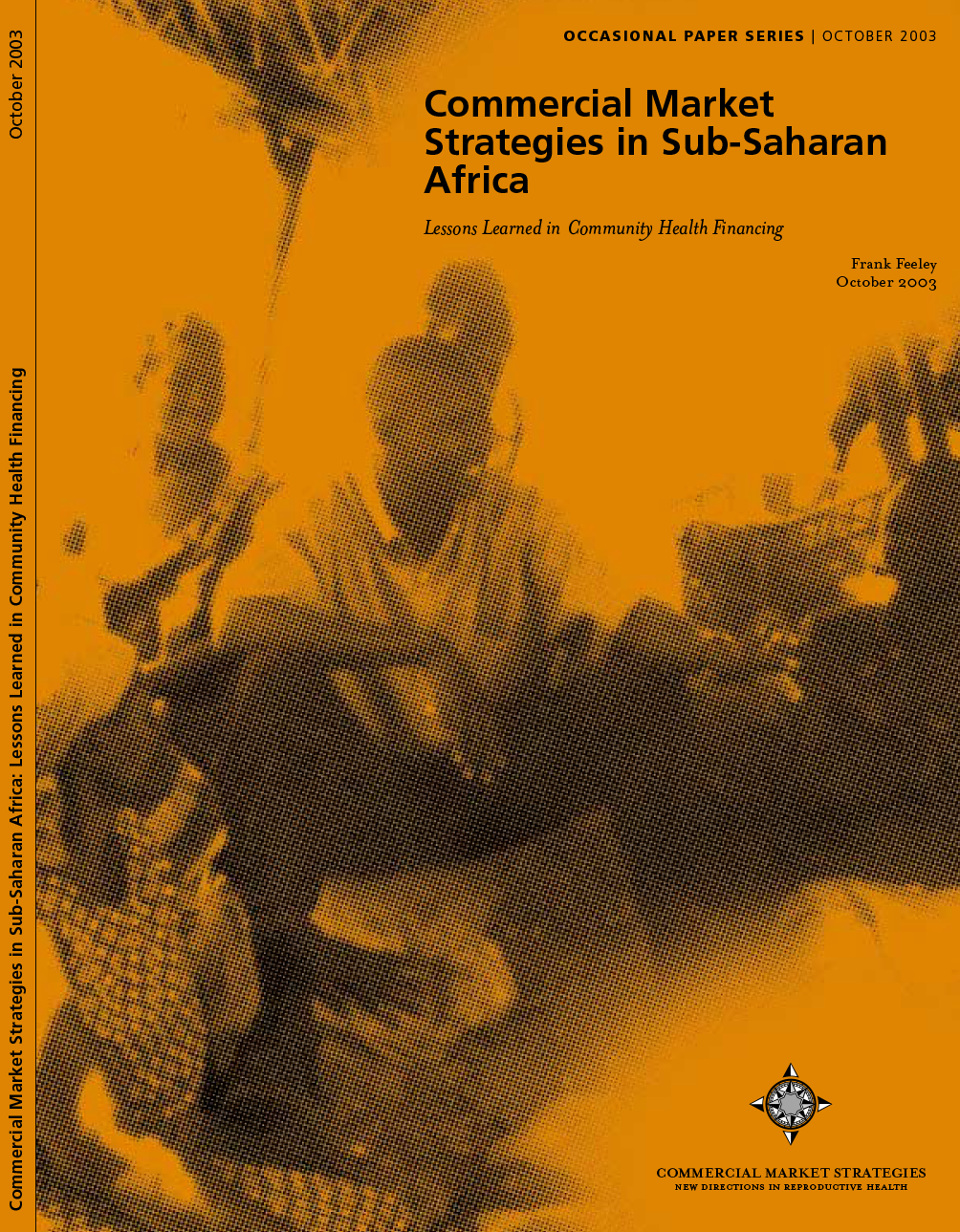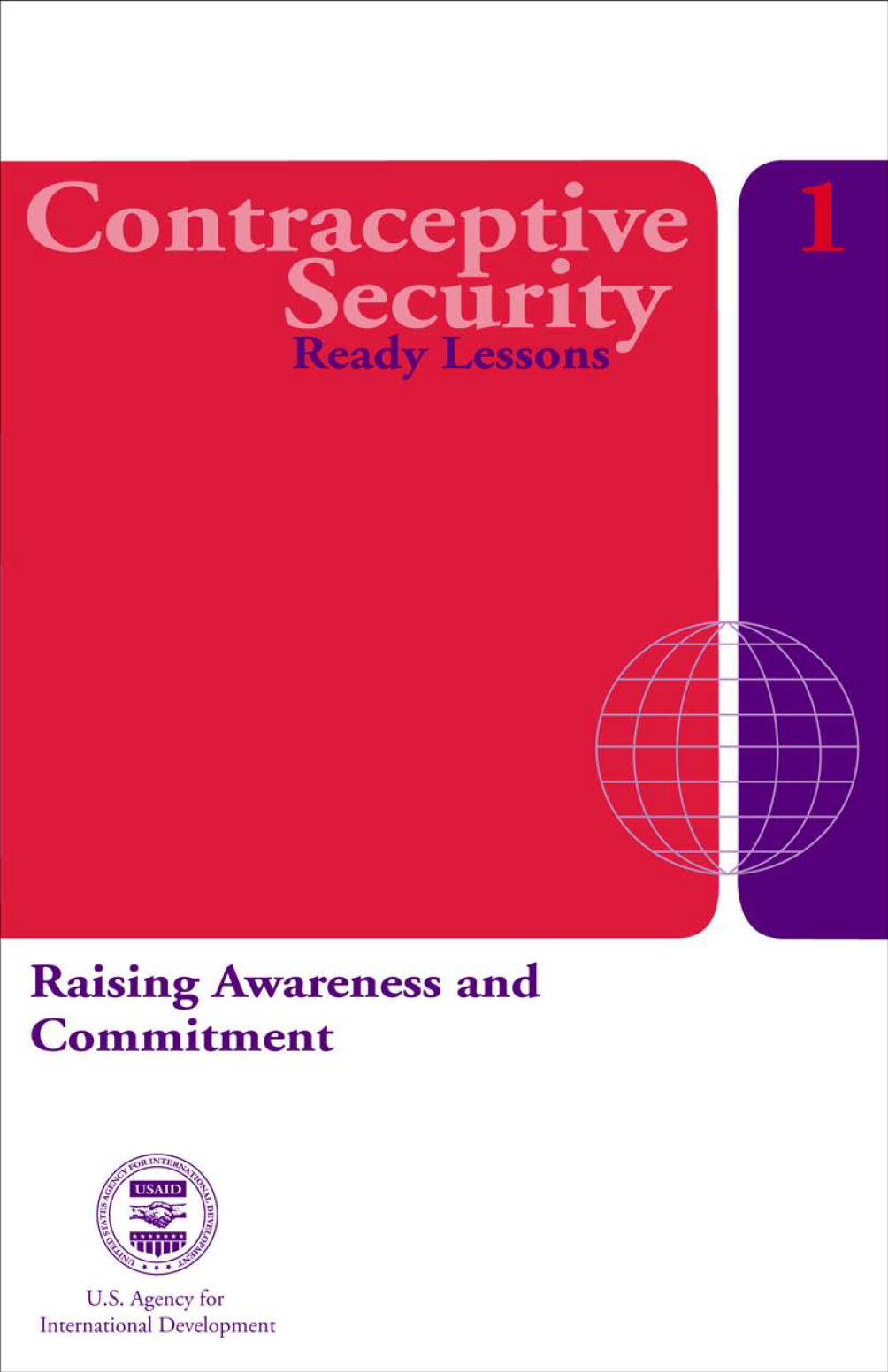
Resource Library
Willingness to Pay: A Practitioner's Perspective
Mr. Alex Banful is the Managing Director of the Ghana Social Marketing Foundation (GSMF) and has over 20 years of experience working in different private sector activities in Ghana such as health communications, and contraceptive social marketing. Mr. Banful presented this case study at the Willingness to Pay Panel. The case study demonstrates how the results from a Willingness to Pay survey were used by GSMF to guide its social marketing program.
Resource Type : Presentation
Country : Ghana
Year : 2005-05-16T14:30:00
Language : English
Project : SHOPS

Resource Library
Country Profile: Ghana
Country profiles are four- to eight-page summaries of CMS's country programs. They provide an overview of the local context and discuss program goals, design, challenges, evolution, and impact.
Resource Type : Brief
Country : Ghana
Year : 2003-10-01T14:15:00
Language : English
Project : SHOPS

Resource Library
Business Strategies for the Reproductive Health NGO.
During the past five years CMS has worked with NGOs in twelve countries, helping them become more sustainable. CMS's philosophy of NGO sustainability is strongly business-oriented: In order to support and maintain quality programs, it is essential to have a healthy financial base, solid governance, and a long-term planning processes. To illustrate CMS's strategies, results, and lessons learned, this paper draws on five country examples: Ghana, the Dominican Republic, Brazil, Nicaragua, and Uganda. CMS's experience highlights the importance of financial and organizational planning, of choosing wisely from a wide range of marketing techniques, and of constantly surveying the environment for new opportunities. The case studies also illustrate how donor funding can be a double-edged sword – receiving additional resources does not automatically lead to success. Lastly, the case studies demonstrate that even in challenging settings, NGOs can usually find a way to diversify products, services, or funding, and that throughout the process, a focus on the organization's social mission is key.
Resource Type : Other
Country :
Year : 2004-01-01T16:15:00
Language : English
Project : SHOPS

Resource Library
In its efforts to expand the availability of primary and reproductive health care services in the private Health Financing
In its efforts to expand the availability of primary and reproductive health care services in the private sector, the Commercial Market Strategies project provided technical assistance to community health insurance plans in Ghana and Uganda. This paper summarizes the CMS experience and makes suggestions for future technical assistance. Suggestions included raising awareness of the many constraints on including reproductive health benefits in community health insurance; acknowledging the need for a new financial model that takes into account provider financial conditions to assess the feasibility of community plans; placing greater emphasis on provider-based plans; developing methods to increase enrollment and reduce the cost of marketing and premium collection; and maximizing the potential for sale of insecticidetreated bed nets through community plans.
Resource Type : Other
Country : Ghana
Year : 2003-10-01T14:30:00
Language : English
Project : SHOPS

Resource Library
Socioeconomic Characteristics of Enrollees in Community Health Insurance Schemes in Africa.
The CMS project provided technical assistance to the Nkoranza Health Plan in Ghana (a hospital-based plan primarily offering inpatient care — the only exception being outpatient care for dog and snake bites) and the Lacor Health Plan (a hospital-based plan offering inpatient and outpatient care to small groups in war-torn northern Uganda). A study of willingness to pay for a new benefit — normal obstetric delivery — in Nkoranza and the evaluation of the Lacor plan provided two data sets, from which the characteristics of joiners and non-joiners were analyzed.
Resource Type : Report
Country : Ghana
Year : 2004-01-01T17:45:00
Language : English
Project : SHOPS

Resource Library
Health Financing in Ghana: Willingness to Pay Increased Prices for Reproductive Health Products and Services in Ghana
Limited government and donor resources, as well as the need to serve ever-increasing reproductive health (RH) needs, dictate that the partners for reproductive health in Ghana — the Ministry of Health, Planned Parenthood Association of Ghana, and the Ghana Social Marketing Foundation — find new ways to increase sustainability and expand financial resources. One way to increase sustainability is to improve cost recovery by increasing prices for RH products and services. This report is based on data collected from client intercept surveys to determine the willingness to pay more for RH products and services among men and women. For almost all products, more than 75 percent of clients say they are willing to pay at least 50 percent more than they are currently paying. The report also addresses the question of what would happen if prices increased too much for clients be able to afford their current family planning product. The results indicate that fewer than 10 percent of current clients would stop using family planning. The majority said they would seek a cheaper brand at their current source of supply or try to find a cheaper source for the same brand. The author concluded that there is adequate room for marketers and policymakers to increase prices for all classes of family planning products in Ghana.
Resource Type : Report
Country : Ghana
Year : 2002-01-01T17:30:00
Language : English
Project : SHOPS

Resource Library
Health Financing in Ghana: Willingness to Pay for Normal Delivery Benefits in a Community-Based Health Insurance Plan
Births attended by skilled birth attendants and/or those at medical facilities are significantly associated with better birth outcomes, including reduced maternal mortality. Nkoranza is a rural district in Ghana with a population estimated at 128,000 in 2000. The Catholic Diocese of Sunyani launched the Nkoranza Community Health Plan (NCHP) in 1992. The plan was a response to the inability of district residents to pay for their health care, especially hospitalization, following the introduction of the cash-and-carry system into Ghana's health sector in the late 1980s. For some time, women in Nkoranza have sought to have normal deliveries covered by the plan. The Sunyani Diocese health system and hospital administrators were interested in expanding the plan's benefits package to include this service. They were unsure, however, of the impact of such a benefit on premiums and enrollment and were concerned about creating demand for inpatient deliveries that could not be met in the present facility. The Commercial Market Strategies project provided technical assistance to NCHP to assess the cost of introducing a normal birth delivery benefit and the willingness of consumers to pay for the increased premium to cover the expanded benefits package. Ninety-six percent of currently enrolled women surveyed in Ghana's Nkoranza district were willing to pay higher insurance premiums for expanded birth-delivery benefits.
Resource Type : Report
Country : Ghana
Year : 2002-01-01T12:00:00
Language : English
Project : SHOPS

Resource Library
Creating Conditions for Greater Private Sector Participation in FP/RH: Benefits for Contraceptive Security
Private sector involvement is crucial not only in helping respond to growing market demand but also in expanding consumer choices and ensuring equity in the contraceptive market. Evidence from many countries shows that the nonpoor benefit disproportionately from free and subsidized public sector services and commodities (Winfrey et al., 2000). A recent analysis of 10 donor-dependent countries reveals that 45 percent of pills and 56 percent of condoms supplied, respectively, by the public sector and social marketing initiatives went to those who could otherwise afford to pay for them (Sine, 2002). Redirecting wealthier/middle-income clients to the private sector will free up scarce donor and public resources for those most vulnerable and in need. A recent market segmentation study in the Philippines shows that shifting middle- and high-income users of government services to the private sector would reduce the burden on the public sector by more than 40 percent (Alano et al., 2002). It is important to recognize that more than one-third of all family planning users in the developing world already obtain contraceptives from the private sector (Rosen and Conly, 1999). In countries such as Cameroon, Colombia, the Dominican Republic, Ghana, and Jordan, more than 60 percent of users obtain their contraceptives from private rather than public sources (Ross et al., 1999). Given that the private sector in many countries is already a major player in the contraceptive market, any feasible contraceptive security plan needs to take into consideration the private sector's current and potential role. This policy brief provides an overview of processes, strategies, and tools that developing countries can adopt to foster complementary public/private sector roles that enhance the private sector's contribution to contraceptive security. Specifically, the brief examines the roles of the public and private sectors in the provision of contraceptives and condoms; and describes strategies/mechanisms used at both the policy and operational levels to mobilize the private sector.
Resource Type : Other
Country : Dominican Republic, Ghana, Jordan, Philippines
Year : 2004-06-01T16:30:00
Language : English
Project : SHOPS

Resource Library
The Commercial Market Strategies Final Report
The Commercial Market Strategies (CMS) project was the flagship private-sector project of USAID's Office of Population and Reproductive Health (G/PRH). CMS was designed to increase the use of family planning and other health products and services through the private sector. From 1998 to 2004, CMS worked in 29 countries to develop and implement a wide range of country programs, technical assistance projects, new initiatives, and global research — all with the aim of expanding access of family planning products and services through commercial approaches and private-sector partnerships. The CMS Final Report provides a comprehensive examination of the technical strategies, accomplishments, results, and lessons learned from the project's programs and activities. A major finding is that commercial organizations are a key resource for donors and development projects in accomplishing health sector objectives, particularly for family planning and reproductive health care. CMS programs involved partnerships with the private sector in a broad range of countries (including India, Morocco, Jordan, Senegal, Uganda, Ghana, Madagascar, Nepal, Nicaragua, and the Philippines), which resulted in improved access to, and quality of, family planning products and services. Through these programs, CMS provided consumers with valuable information about, and access to, essential health products, such as modern contraceptives, oral rehydration therapies, insecticide-treated malaria nets, treatment kits for sexually transmitted infections, and voluntary testing and counseling services for HIV/AIDS. This report also provides detailed information on the various technical strategies used by CMS, including social marketing, support for provider networks, health financing, sustainability for health care non-governmental organizations, corporate social responsibility, and policy.
Resource Type : Report
Country : Ghana, India, Jordan, Madagascar, Morocco, Nepal, Nicaragua, Philippines, Senegal, Uganda
Year : 2004-01-01T15:00:00
Language : English
Project : SHOPS

Resource Library
Contraceptive Security Ready Lessons 1: Raising Awareness and Commitment
Lack of financing for supplies is often blamed for contraceptive shortages. However, the challenges to achieving contraceptive security come from many fronts. In most countries, the problem is not only one of financing, but also of disruptions and vulnerabilities in the many systems needed to ensure that contraceptives and condoms are available to people.
Resource Type : Other
Country : Bangladesh, Ghana
Year : 2003-01-01T16:00:00
Language : English
Project : SHOPS
Pagination
- Previous page
- Page 8








